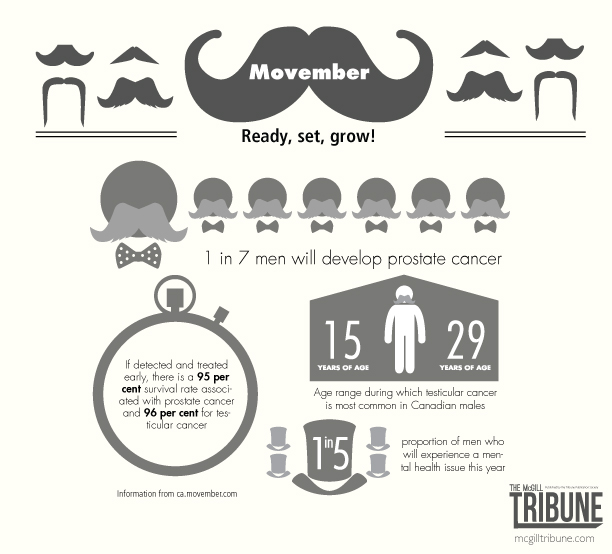This past weekend, men around the world shaved their faces baby smooth to embark on a hairy month-long journey to change the face of men’s health. Through the medium of a moustache, the annual Canadian Movember campaign raises funds for Prostate Cancer Canada, awareness of the disease itself, and, as of last year, more broadly of other men’s health issues such as testicular cancer and mental health.
At this time every year, the McGill campus is covered with facial hair ranging from adolescent wisps to full grown ‘Tom Sellecks.’ The campaign has garnered a lot of enthusiasm due to its college demographic appeal.
“Movember works in the same way a blogsphere works—in a hilarious narcissistic fashion with a political edge,” Kate Whiteway, U3 Arts and a supporter of the Movember campaign, says. “The reason it gets attention is because it is so farcical, but still gets its positive communal message to work. It’s perfect for college.”
According to Emannuel Sarantonis, a U1 Engineering student and an active ‘Mo Bro,’ Movember is both a competition between friends for laughs and a fundraiser for an important cause.
“You don’t have to grow a beard to support this cause,” he says. “There are many ways to fundraise.”
Beyond individual participations and friendly competitions, McGill has its very own Movember teams that raise large amounts of money through ‘Mo parties,’ and the involvement of on-campus athletics, faculty clubs, and administration. ‘Mo Sistas’ can also get involved, by supporting and encouraging ‘Mo Bros’ and their new furry friends to break down conversational barriers on men’s health.

In 2012, the McGill network raised a combined $82,815 for men’s health awareness and has raised over $164,000 in the last three campaigns.
However, the Movember movement is certainly not without its share of criticism. According to Nathaniel Laywine, a PhD student in Communications Studies, people are too vague when they say that fundraising goes towards “Movember.” The spectacle immerses the student population in the Movember culture, whether it is the moustache shot glasses at Gerts or that guy in class with an impressive handle.
“Public awareness campaigns like such are more about the spectacle of it than it is about actually raising funds or educating people,” Laywine says.
A quick ask around the campus reveals that many are unclear about the purpose of the campaign behind the ‘stache. Such concerns may overshadow the tangible successes achieved by Movember. For instance, most people are likely unaware that in Quebec alone, the movement has been able to directly fund 42 research programs on male health.
Movember can sometimes be perceived as a mere excuse to grow a mustache and show off masculinity. Whiteway expressed concern that a campaign that hinges upon open discussions on universal male health boxes masculinity into old-age conservatism, with the moustache as the ultimate symbol of the “real man.”
Redefining what constitutes “masculine” does become important given Movember’s recent expansion into the area of male mental health. According to Dr. Denise Rochon, a psychiatrist at McGill’s Student Mental Health Service, the most obstinate barrier to seeking treatment for many men is the fear of emasculation.
“There is a stigma, [and] there are definitely [fewer] males who seek mental health treatment,” she says. “Men are scared of talking about their feelings and feel naked when they are part of a treatment.”
She adds that male college students also face the danger of self-medicating through readily accessible alcohol and drugs to curb their depression and anxieties. Rochon said she would like to see campaigns like Movember seek to engage in the “demystification of male health.”
Despite these concerns about its method of raising awareness, Movember definitely generates conversation where there has been little before. As will be evident from the abundance of facial hair soon to be growing from students at McGill this season, there can be little doubt that the attention generated by Movember is a healthy stepping stone towards comprehensive conversations on men’s health.









